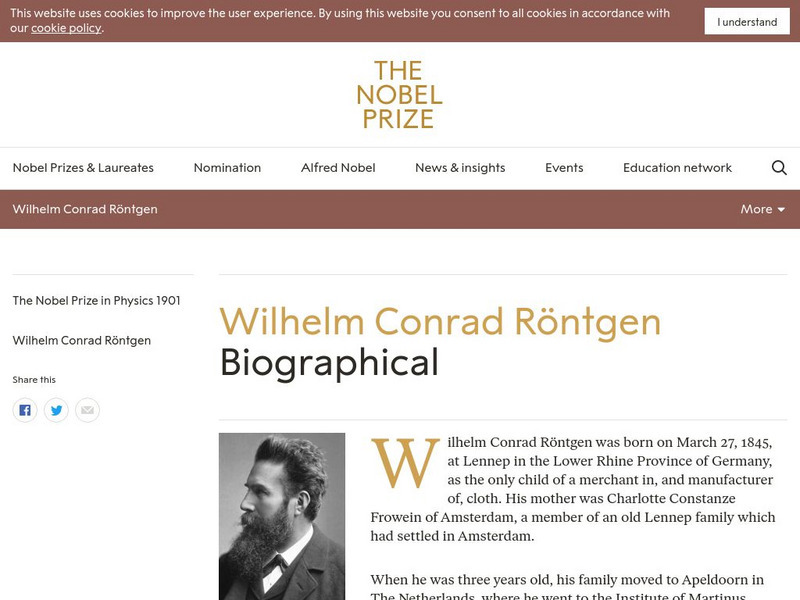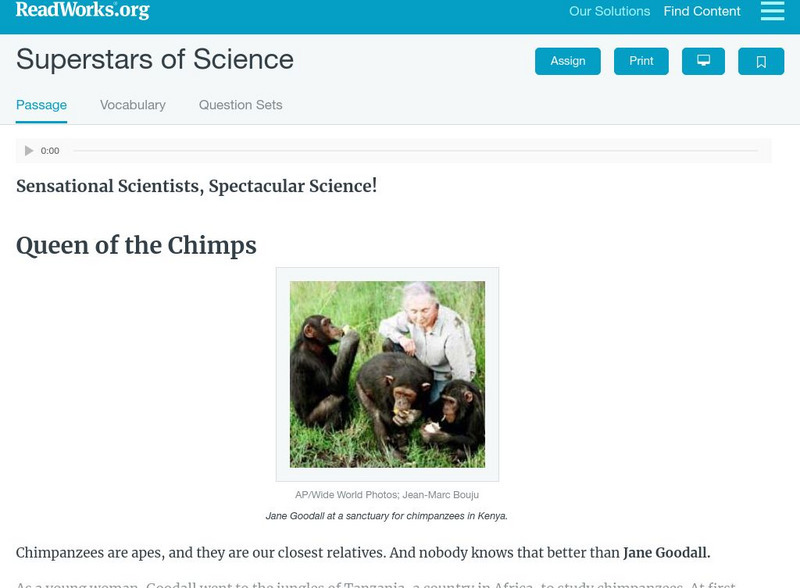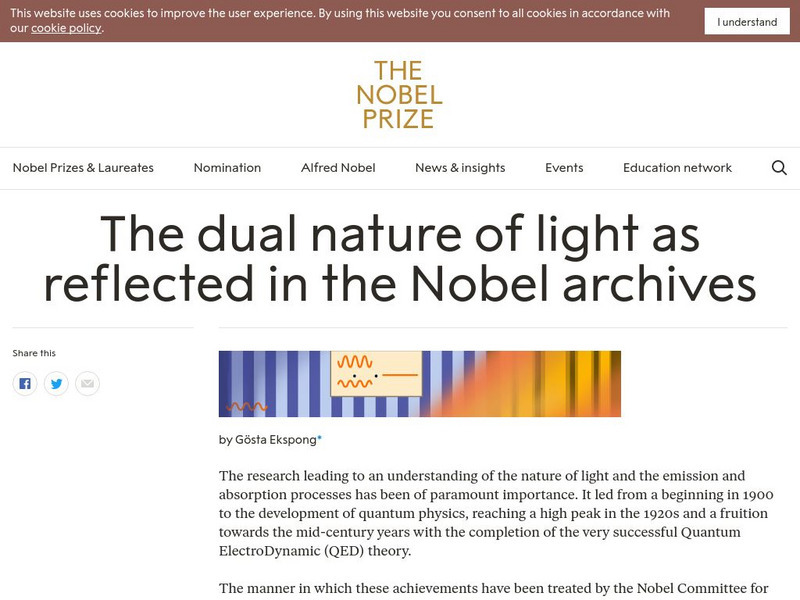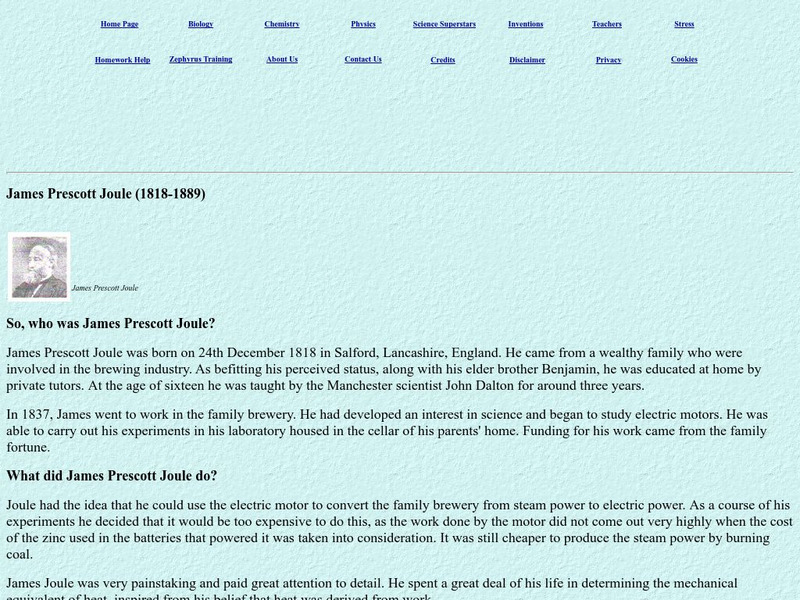Other
Isaac Newton
A page at the Isaac Newton (1642-1727 CE) Institute for the Mathematical Sciences website. This page, the contents of which come from the Microsoft Encarta encyclopedia, describes the upbringing, the education, the scientific and...
Nobel Media AB
The Nobel Prize: Wilhelm Conrad Rontgen Biographical
This biographical note on Wilhelm Conrad Rontgen describes his boyhood, upbringing, education, scientific work and accomplishments. Focuses on his studies of Xrays.
Read Works
Read Works: Superstars of Science
[Free Registration/Login Required] Students read about scientists Jane Goodall, Stephen Hawking, Dean Kamen, Rachel Carson, and Charles Henry. A question sheet is available to help students build skills in classifying and categorizing.
Read Works
Read Works: Focus on Scientists
[Free Registration/Login Required] An informational text about different types of scientists including: an inventor, a forensic scientist, an astronomer, a primatologist, and more. A question sheet is available to help students build...
Read Works
Read Works: Cool Prize
[Free Registration/Login Required] This nonfiction passage gives information about the prize-winning photos of Kenneth Libbrecht and classifications of snowflakes. This passage reinforces essential reading comprehension skills....
Read Works
Read Works: No Problem!
[Free Registration/Login Required] An informational text about how to solve a problem. A question sheet is available to help students build skills in reading comprehension.
Nobel Media AB
The Nobel Prize: Jean Baptiste Perrin Biographical
The Nobel Foundation provides a biography of the scientist who won 1926 Nobel Prize Physics, Jean Baptiste Perrin.
Read Works
Read Works: Focus on Scientists
[Free Registration/Login Required] This nonfiction article shares information about different types of scientists. This passage is a stand-alone curricular piece that reinforces essential reading skills and strategies and establishes...
Fun Brain
Fun Brain: Who Is That? (u.s. Presidents, Scientists & Mathematicians)
A fun game in which players use clues to identify important figures in history (either U.S. presidents or famous scientists and mathematicians).
University of St. Andrews (UK)
University of St. Andrews: James Clerk Maxwell
Research resources for James Maxwell (1831-1879), who did revolutionary work on electricity and magnetism and on the kinetic theory of gases.
University of St. Andrews (UK)
University of St. Andrews: A Visit to James Clerk Maxwell's House
From the MacTutor History of Mathematics website, this page allows students to see the Edinburgh home of the 19th century Scottish physicist James Clerk Maxwell.
American Psychological Association
Apa: Interesting Careers in Psychology
Focus on non-academic careers for scientific psychologists. Provides links to several scientific psychologists who explain how they secured a job in a nontraditional setting outside the "lab" or "university setting."
Nobel Media AB
The Nobel Prize: The Dual Nature of Light as Reflected in the Nobel Archives
This article discusses the historical figures who contributed to our understanding of the nature of light, x-rays, Quantum ElectroDynamic (QED) theory, and so on.
University of Houston
University of Houston: Engines of Our Ingenuity: Count Rumford
A transcript, from a syndicated radio broadcast, that discusses the life and scientific accomplishments of Count Rumford. An anecdotal account of Rumford's contribution to our understanding of heat. Contains a good deal of biographical...
Northwestern University
Di Humani Corporis Fabrica
A historically significant translation of the groundbreaking text on human anatomy that changed the study of anatomy forever.
Trinity College Dublin
The History of Mathematics: Roemer
A short biographical sketch of the life and work of Ole Roemer (1652-1719 CE). Identifies his scientific discoveries and contributions in astronomy.
Other
Canadian Content: Famous Canadian Inventors and Scientists
Includes a list of well known Canadian scientists and inventors with biographical information included.
Other
Zephyrus James Prescott Joule
Short biographical site dedicated to James Prescott Joule (1818-1889).
Other
Science Superstars: Anton Van Leeuwenhoek
This site is provided for by Zephyrus. So, who was Anton van Leeuwenhoek (1632 -1723 CE)? What else did Leeuwenhoek do? Did he achieve anything else? What honors were awarded to him? These questions are answered in this informative site.
Smithsonian Institution
National Postal Museum: Art of the Stamp: Joseph Priestley
View the artwork for a U.S. postage stamp issued in 1983 to commemorate Joseph Priestley, the scientist who discovered oxygen. With a short passage on his contributions to the teaching of history, religion, and science.
National Women's Hall of Fame
National Women's Hall of Fame: Chien Shiung Wu
This brief biography from the National Women's Hall of Fame highlights the work of Chien-Shiung Wu (1912-1997 CE) and her many accomplishments in the field of science.
National Institutes of Health
Niehs: What Is Science and Who Are Scientists?
Learn what science is and what scientists do. Scientists are named for what they study; discover some of the more common branches of science.
ClassFlow
Class Flow: Telescope a Scientists Tool
[Free Registration/Login Required] This flipchart is designed to teach and extend the concept that telescopes are tools for scientists to study distant objects. Included in this flipchart are websites and an Activote assessment.
University of St. Andrews (UK)
University of St. Andrews: Isaac Newton (1643 1727)
This life of Isaac Newton' traces his life from birth through childhood to his rise as a renown scientist and mathematician.
























